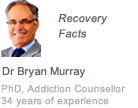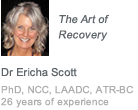Ketamine Addiction
Ketamine addiction came about shortly after the drug was first prescribed for use in humans – it was used initially as an anesthetic in veterinary medicine, particularly for cats. Ketamine is known for its’ so called ‘dissociative’ effect, which means it has the ability to block certain signals from the conscious mind to other parts of the brain. In other words it can cause strong hallucinations that can be compared to a state of dreaming or being in a trance. The mind is in a way separated from the body in this state, and one is not able to feel pain.
What is ketamine?
Ketamine is a synthetic drug, and comes in the form of powder, pill or liquid and is swallowed (powder is dissolved in hot water), snorted or injected. The drug is often referred to as Special K, Vitamin K or ‘Death Drug’. When used in a very high dose, the state of mind a person is transported to by the ketamine is called a ‘K-hole’ and is compared to a near death experience; going through a dark tunnel where one sees light at the end. At that stage it is impossible for a person to speak or move. Depending on ones’ state of mind, where the user is and how safe or anxious they felt before using Ketamine the experience can either be positive, when users will often say it was spiritual, or terrifying.
When is ketamine used?
As mentioned earlier, Ketamine is a dissociative drug; it gives the effect of the user having a disconnection of the mind from the body. In other words; perception and sensation are not connected. People who use it are looking for a ‘trip’ that brings them into an hallucinatory state, a state where pain cannot be felt. Because of the distortions of the human senses during a high from ketamine, users will often sit or lay down as part of their preparation. This is quite sensible, as they will not be fully aware of where their body is during the high, and are likely to fall if they do not make sure they cannot do so.
Used only in very small doses, as a so called; ‘club drug’ ketamine is also used by people who attend dance parties. The idea is to get into a relaxed mood faster and to be able to dance in a trance like state for as long as possible; the body is not able to tell the brain that it is dehydrated, feels pain or has reached a point of fatigue. Usually small amounts of Ketamine are used to reach that stage, because in high doses Ketamine causes a state of mind that disables a person to stand or walk, let alone dance.
Addicted? The signs and effects
Ketamine is a fast working drug; if swallowed the effects are noticeable after as little as 5 minutes, if the user has a full stomach it may take up to 20 minutes, response to an injection of ketamine are fast – between 1 to 5 minutes and after snorting it can be from 5 to 15 minutes. Ketamine users often develop a strong mental addiction and if used on a regular basis the body develops a tolerance; users will have to use higher doses of it to attain the desired effect. There are people who can use Ketamine every now and then, but the majority of users will find that they have a craving which will develop further into ketamine addiction when they need the drug just to get through the day.
If we reach a point where we cannot function without using Ketamine, we have to face the fact that it has become an addiction. This addiction has many dangers; physical as well as psychological. Because Ketamine stops the body sending pain alerts to the brain users are likely to hurt themselves severely without being aware of the injury. Side effects of using Ketamine can include:
- Nausea
- Severe vomiting
- Coma
- Loss of conciousness
- Brain damage
- Motor function impairment
- Loss of speech
- Slurring of speech
- Paranoia
- Death
Ketamine users run the risk of suffocation by inhaling their vomit, and severe lung damage can also occur.
The psychological effects of Ketamine abuse are very serious; it can lead to a bad trip and the resulting anxiety or paranoia can continue for days or even weeks. Long term abuse can cause loss of memory, especially when Ketamine is used in combination with other drugs. Users with a history of psychological or mental problems are particularly at risk of psychosis, psychotic episodes and uncontrollable paranoia.
Getting help for ketamine addiction
Ketamine addiction follows the same patterns as many other drug addictions. Users start by experimenting, develop a physical tolerance which quickly leads to addiction and so they are wrapped in the cycle of extreme highs and horrendous crashes.
Recognizing the cycle of addiction is the first step to battling and recovering from it. There are many professionals who can assist, different options for detox, rehab and recovery treatment paths. It is a question of finding the best methods and paths for you. Each addiction is unique to the addict, framed by the personal experiences and traumas of the individual concerned. Addressing the issues one by one and tackling the mountain of addiction rehab and recovery one stride at a time is the only way to do it.
But you do not need to try and do it alone. Whether you call a friend, tell a family member that you have a problem or make an appointment with your physician – taking that first step will make enough of a difference to put you on the path facing a healthy and drug free life.
You can ask for a referral to a rehab center or clinic, you can choose a residential programme or an outpatient course if you feel you can kick your addiction that way. You can decide to go for an holistic rehab programme, where you can detox and get a variety of therapies to help you achieve sustained recovery. All of these choices are there – so what are you waiting for?
If you have a problem and are ready to do something about it pick up the phone, make a call and get started.
If you are worried about a loved one, a friend or a family member there is no need to sit around and hope they might realize they have problem. You can start the ball rolling, now if you want to.












